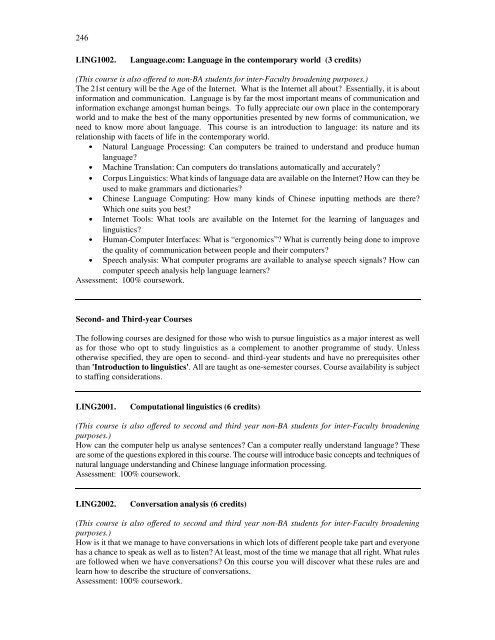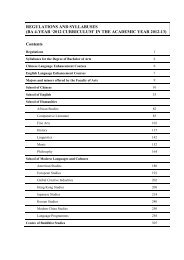Bachelor of Arts (BA) - The University of Hong Kong
Bachelor of Arts (BA) - The University of Hong Kong
Bachelor of Arts (BA) - The University of Hong Kong
Create successful ePaper yourself
Turn your PDF publications into a flip-book with our unique Google optimized e-Paper software.
246LING1002.Language.com: Language in the contemporary world (3 credits)(This course is also <strong>of</strong>fered to non-<strong>BA</strong> students for inter-Faculty broadening purposes.)<strong>The</strong> 21st century will be the Age <strong>of</strong> the Internet. What is the Internet all about? Essentially, it is aboutinformation and communication. Language is by far the most important means <strong>of</strong> communication andinformation exchange amongst human beings. To fully appreciate our own place in the contemporaryworld and to make the best <strong>of</strong> the many opportunities presented by new forms <strong>of</strong> communication, weneed to know more about language. This course is an introduction to language: its nature and itsrelationship with facets <strong>of</strong> life in the contemporary world.Natural Language Processing: Can computers be trained to understand and produce humanlanguage?Machine Translation: Can computers do translations automatically and accurately?Corpus Linguistics: What kinds <strong>of</strong> language data are available on the Internet? How can they beused to make grammars and dictionaries?Chinese Language Computing: How many kinds <strong>of</strong> Chinese inputting methods are there?Which one suits you best?Internet Tools: What tools are available on the Internet for the learning <strong>of</strong> languages andlinguistics?Interfaces: What is “ergonomics”? What is currently being done to improvethe quality <strong>of</strong> communication between people and their computers?Speech analysis: What computer programs are available to analyse speech signals? How cancomputer speech analysis help language learners?Assessment: 100% coursework.˙Second- and Third-year Courses˙ Human-Computer<strong>The</strong> following courses are designed for those who wish to pursue linguistics as a major interest as wellas for those who opt to study linguistics as a complement to another programme <strong>of</strong> study. Unlessotherwise specified, they are open to second- and third-year students and have no prerequisites otherthan 'Introduction to linguistics'. All are taught as one-semester courses. Course availability is subjectto staffing considerations.LING2001.Computational linguistics (6 credits)(This course is also <strong>of</strong>fered to second and third year non-<strong>BA</strong> students for inter-Faculty broadeningpurposes.)How can the computer help us analyse sentences? Can a computer really understand language? <strong>The</strong>seare some <strong>of</strong> the questions explored in this course. <strong>The</strong> course will introduce basic concepts and techniques <strong>of</strong>natural language understanding and Chinese language information processing.Assessment: 100% coursework.LING2002.Conversation analysis (6 credits)(This course is also <strong>of</strong>fered to second and third year non-<strong>BA</strong> students for inter-Faculty broadeningpurposes.)How is it that we manage to have conversations in which lots <strong>of</strong> different people take part and everyonehas a chance to speak as well as to listen? At least, most <strong>of</strong> the time we manage that all right. What rulesare followed when we have conversations? On this course you will discover what these rules are andlearn how to describe the structure <strong>of</strong> conversations.Assessment: 100% coursework.
















